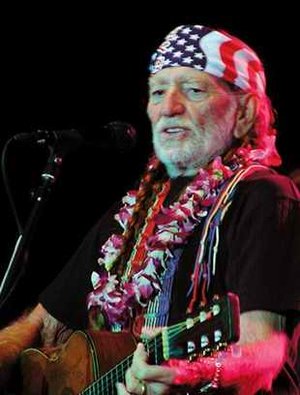Outlaw country
|
|
Outlaw country was a significant trend in country music during the late 1960s and the 1970s. The focus of the movement has been on self-declared "outlaws" such as Waylon Jennings, Johnny Cash, Merle Haggard and Willie Nelson. The reason for the movement has been attributed to a reaction to the Nashville sound, developed by record producers like Chet Atkins who softened the raw honky tonk sound that was predominant in the music of performers like Jimmie Rodgers, and his successors such as Hank Williams, George Jones and Lefty Frizzell. According to Aaron Fox (2004, p.51) "the fundamental opposition between law-and-order authoritarianism and the image of 'outlaw' authenticity...has structured country's discourse of masculinity since the days of Jimmie Rodgers."
The 1960s was a decade of enormous change and the change was reflected in the revolution in the music of the time. The Beatles, Bob Dylan, the Rolling Stones cast off the traditional role of the recording artist. They wrote their own material, they had creative input to their albums, they refused to conform to what society required of its youth. At the same time, country music was declining into a fomulaic genre which appeared to offer the establishment what it wanted. Jim Reeves, Dolly Parton, Patsy Cline and others were making the kind of music that was anathema to the growing counter culture. While Nashville continued to be the heart of country music, its soul was to be found in Lubbock, Bakersfield and Austin.
The term "outlaw country" is derived from the song "Ladies Love Outlaws" written by Lee Clayton and sung by Waylon Jennings on the 1972 album of the same name. It became associated with singers who grew their hair long, wore denim and leather and looked like hippies in contrast to the clean cut country singers in Nudie suits that were pushing the Nashville sound. The success of these singers did much to restore the rawness and life force to country music. The songs were about drinking, drugs, hard working men and honky tonk heroes. The music was more like rock and roll and there were no strings in the background.
Although Jennings and Nelson are regarded as the stereotypical outlaws, there were several other writers and performers who provided the material that infused the movement with the outlaw spirit. Some people have noted that Waylon and Willie were Nashville veterans whose careers were revived by the movement and that they drew on the energy that was being generated in their home state of Texas to spearhead the attack on the Nashville producers. Waylon, in particular, forced his record company to let him produce his own albums. In 1973 he produced Lonesome, On'ry and Mean. The theme song was written by Steve Young, a brilliant songwriter and performer who never made it in the mainstream but whose songs helped to create the outlaw style. The follow up album for Waylon was Honky Tonk Heroes and the songwriting hero was Texan Billy Joe Shaver. Like Steve Young, Billy Joe never made it big but his 1973 album Old Five and Dimers Like Me is a country classic in the outlaw genre.
Willie Nelson's career as a songwriter in Nashville peaked in the late 1960s. His "Crazy" was a massive hit for Patsy Cline, but as a singer, he was getting nowhere. He left Nashville in 1971 to return to Texas. The musicians he met in Austin had been developing the folk and rock influenced country music that grew into the outlaw genre. Performing and associating with the likes of Jerry Jeff Walker, Michael Martin Murphey and Billy Joe Shaver helped shape his future career. At the same time as Willie was reinventing himself, other significant influencers were writing and playing in Austin and Lubbock. Butch Hancock, Joe Ely and Jimmie Dale Gilmore formed The Flatlanders, a group that never sold huge numbers of albums but continues to perform. The three founders have each made a significant contribution to the development of the outlaw genre.
Other Texans like Townes van Zandt, Guy Clark and, latterly, Steve Earle have developed the outlaw ethos through their songs and their lifestyles.
Further reading
- Country Music. The Rough Guide,
Kurt Wolff, Rough Guides, 2000, ISBN 1-85828-534-8
Source
- Bad Music: The Music We Love to Hate,
Washburne, Christopher J. and Derno, Maiken (eds.), 2004, Routledge, ISBN 0415943663.- Fox, Aaron A. "White Trash Alchemies of the Abject Sublime: Country as 'Bad' Music"
External links
Outlaw country history (http://www.roughstock.com/history/outlaw.html)
Allmusic.com. Retrieved Mar.14, 2004 from http://www.allmusic.com/cg/amg.dll?p=amg&uid=10:49:01|PM&sql=J289 - Austin in the 70s Kurt Wolff on Texas Outlaws
Allmusic.com. Retrieved Mar.14, 2004 from http://www.allmusic.com/cg/amg.dll?p=amg&uid=10:49:01|PM&sql=J288 - Lubbock Country Scene by Richie Unterberger
Allmusic.com. Retrieved Mar.14, 2004 from http://www.allmusic.com/cg/amg.dll?p=amg&uid=10:49:01|PM&sql=J287 - Outlaw Country by Kurt Wolff
Allmusic.com. Retrieved Mar.14, 2004 from http://www.allmusic.com/cg/amg.dll?p=amg&uid=10:49:01|PM&sql=J284 - Nashville Sound by Cub Koda
To read the articles, include the whole URL in the address pane of your browser.
| Country music | Country genres |
| Bakersfield sound - Bluegrass - Close harmony - Country blues - Honky tonk - Jug band - Lubbock sound - Nashville sound - Outlaw country |
| Alternative country - Country rock - Psychobilly - Rockabilly |
| Styles of American folk music |
|---|
| Appalachian | Blues (Ragtime) | Cajun and Creole (Zydeco) | Country (Honky tonk and Bluegrass) | Jazz | Native American | Spirituals and Gospel | Tejano |

